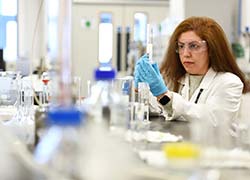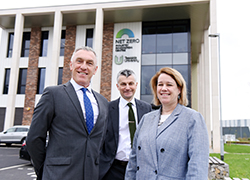Engineering a successful partnership
A Teesside University knowledge transfer partnership has been judged outstanding - one of fewer than 5% nationwide to get the top grade.
Sara Zarei joined Middlesbrough engineering company Stanley Vickers Ltd after helping to improve their manufacturing efficiency and production potential through a Knowledge Transfer Partnership (KTP) with Teesside University.
The Teesside KTP was recently judged as 'outstanding' by a panel of independent assessors from the Technology Strategy Board.
Sara, who won a prestigious Business Leader of Tomorrow award last year, is now the company’s operations and improvements engineer. She’s also completing a PhD looking at ways of applying Automatic Identification and Data Capture system to small and medium-size engineering companies.
She joined the company as a KTP associate after graduating with distinction from Teesside's MSc in Computer-aided Engineering.
Stanley Vickers was set up in 1947 based on general engineering work for the marine industry. In more recent times it has specialised in manufacturing and refurbishing single/twin extruder, injection and blow moulding feed-screws and barrels used in the plastic, rubber and food industries.
They turned to the University after struggling to keep up with demand because of manufacturing breakdowns and realising they were not making the best use of new technology. It was agreed to set up a two-year KTP under the joint supervision of Farhad Nabhani, the University's Professor of Biomechanics and Manufacturing, and Stanley Vickers’ Production Manager David Ford, with Sara appointed to project manage the activity as a KTP associate.
Realising the KTP was a radical step for a company not used to employing graduates or working with academics, a mini project showed how the collaboration could have immediate benefits.
'We upgraded the software and hardware of one of the company’s Computer Numerically Controlled (CNC) machines which we use to manufacture screws up to eight metres long. The machinery dated back to the late eighties and was regularly breaking down”, said Sara.
'The work improved reliability and helped to save the company £27,000 a year.' Sara followed this up by establishing a continuous improvement group identifying key employees and supervising six MSc projects – giving postgraduate students hands-on experience of the real business world and helping streamline business practices.
One of her biggest projects was investigating how a computerised Automatic Identification and Data Capture (AIDC) system could remove bottlenecks, improve the site layout and find a more efficient way to transport and track parts around the split site plant.
Sara said: 'The AIDC system will involve putting a small chip into all of the parts we make here and then use radio-frequency waves to trace in real-time how far through the manufacturing process the different parts have progressed.'
'We knew we had bottlenecks and needed to improve production line practices so we introduced a new enterprise resource planning system to link stock control with scheduling. The old manual job route cards have been replaced with a new fully computerised system. Everything is now being linked together, including invoicing, thanks to help and support from Professor Nabhani.'
The KTP also helped the company to update its in-house semi-automated welding machine.
From Sara’s point of view, the recession helped the KTP. 'It changed people's mindset. They realised things were going to be tough and that if we didn’t change some of our old ways of working the company might not survive.'
Speaking for the company, David Ford said: We’re delighted the KTP project between ourselves and Teesside University has been awarded such a high grade. It’s a testament to the way the KTP encouraged us to adopt a different and more modern approach to introducing new technology. It really opened our minds to new ways of working and we’ve seen vast improvements in the company’s processes and machinery through the KTP project.
'Some people may think a KTP is going to cost the company a lot of money and time, but certainly in our case it has led to large financial savings and we’ve offered Sara a permanent post.
'We’ve also taken on four new apprentices and are looking for another graduate to work on a new CAD-CAM system. Since the KTP has finished last year, production is up by 50% and I only wish we could start another KTP with the University.'
Sara agrees, saying: 'The KTP was a brilliant opportunity to gain vital industrial experience while at the same time working with the University and being able to continue with my studies. I would highly recommend KTPs to graduates in any field as the benefits achieved and the experiences gained have been incredible.'
Professor Nabhani said: 'We’re very pleased with the ‘outstanding’ result awarded for the KTP with Stanley Vickers Ltd. This project was particularly successful for all three stakeholders - Teesside University, Stanley Vickers Ltd and the KTP Associate. As well as direct company benefits, it has provided us with excellent evidence for dissemination into learning and teaching back at the University and has given Sara a wonderful career path as the KTP Associate.'
Debbie Buckley-Golder, Head of Knowledge Exchange at the Technology Strategy Board, said: 'The ‘Outstanding’ grade is a mark of real quality for Knowledge Transfer Partnerships. It’s clear to see that this project with Stanley Vickers has delivered substantial benefits for all partners and this accolade is amply deserved. Congratulations to the whole team on a fantastic collaboration.'
For further information about Knowledge Transfer Partnerships with Teesside University, email KTP@tees.ac.uk or phone 01642 384068.
 Supporting Nigerian farmers by transforming food waste into
...
Supporting Nigerian farmers by transforming food waste into
... International partnership signed with prestigious American
...
International partnership signed with prestigious American
... Teesside University academics join prestigious network of
...
Teesside University academics join prestigious network of
...